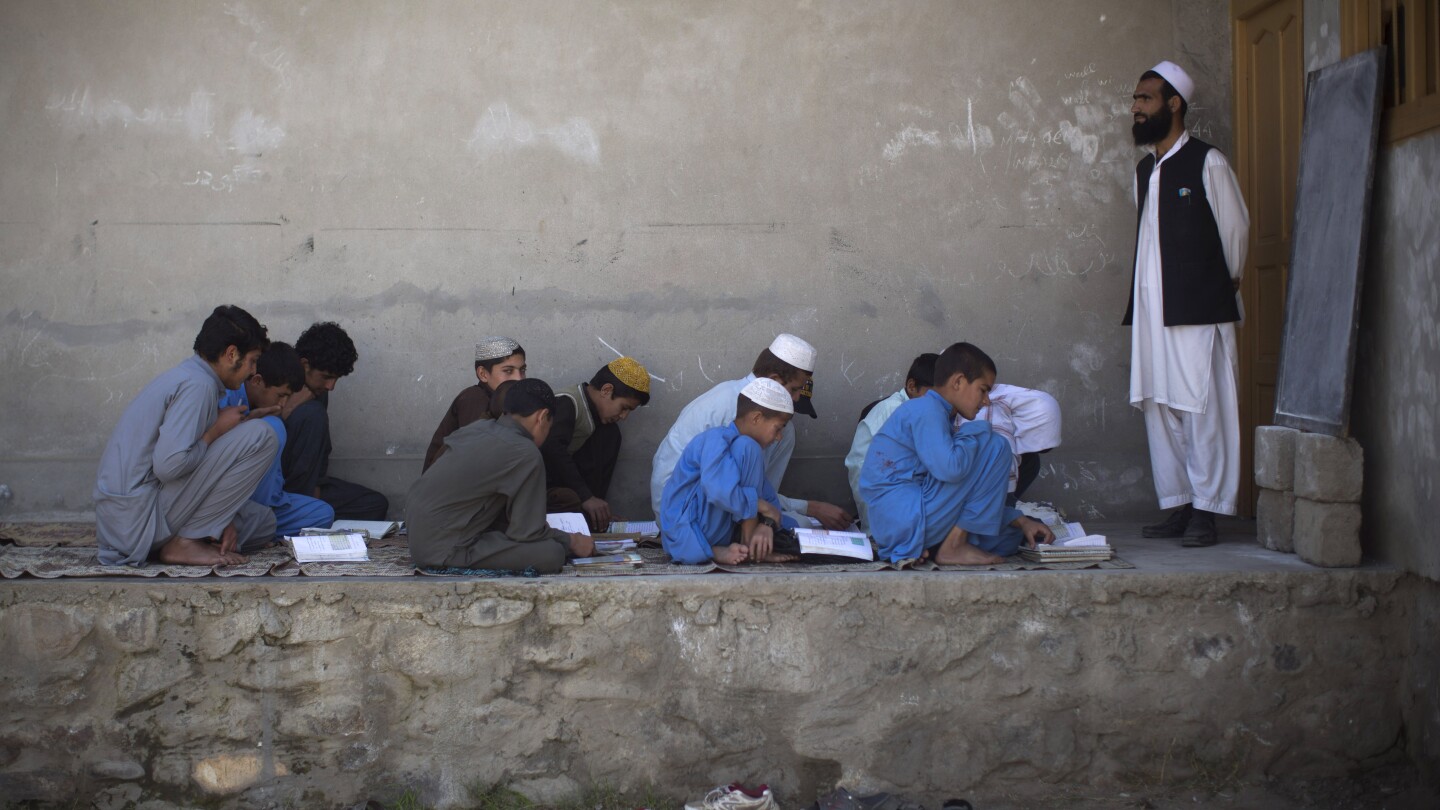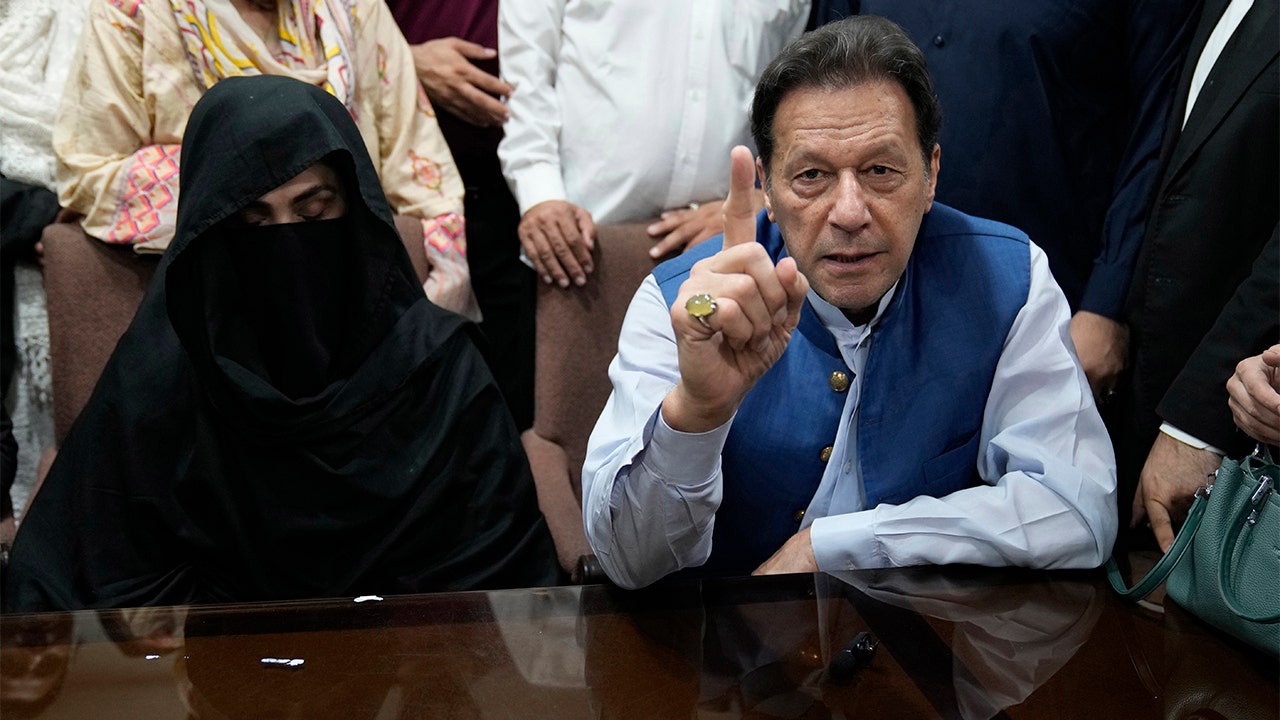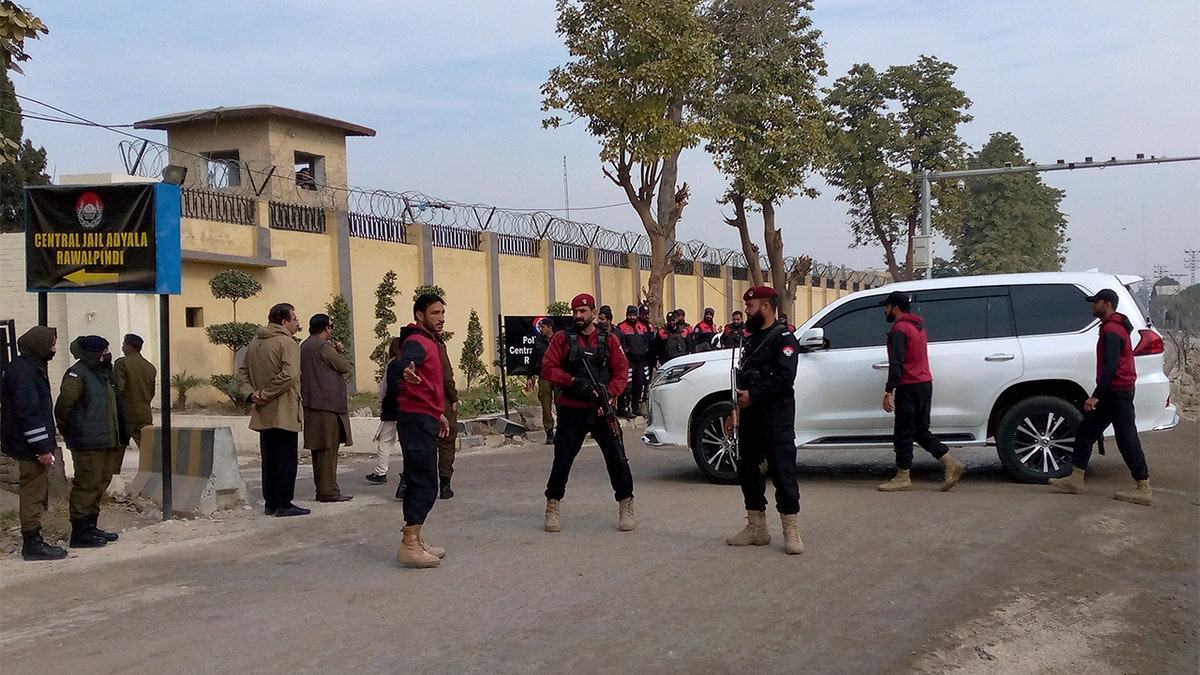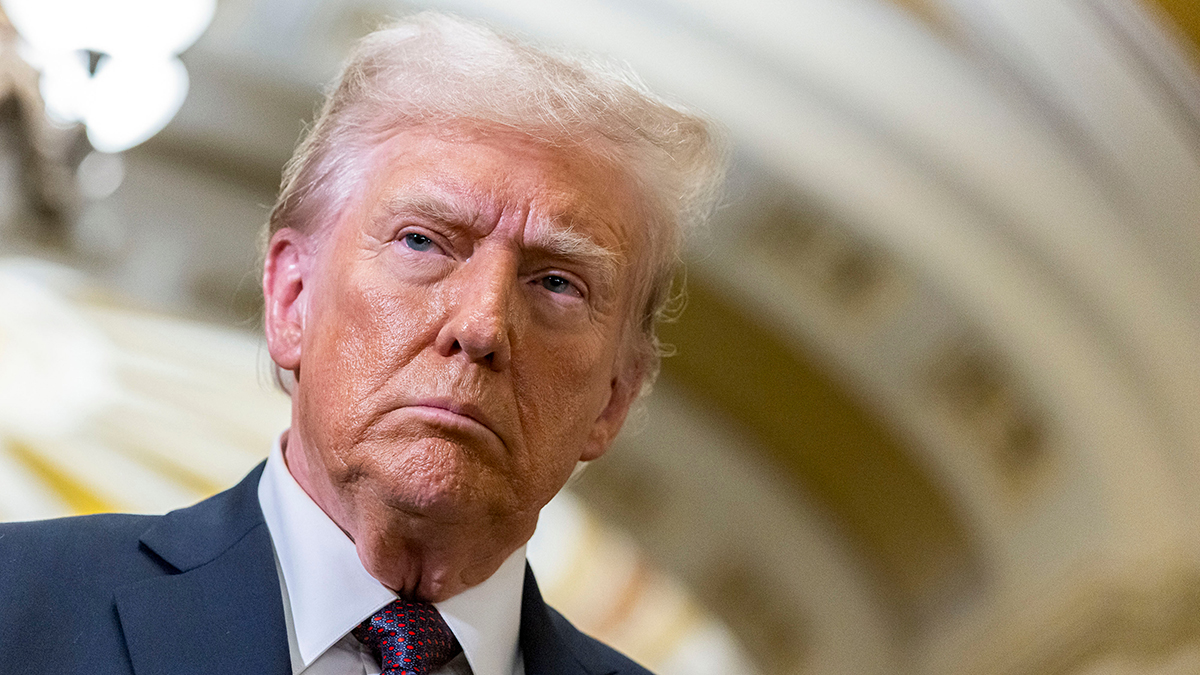World
Taliban’s abusive education policies harm boys as well as girls in Afghanistan, rights group says

ISLAMABAD (AP) — The Taliban’s “abusive” educational policies are harming boys as well as girls in Afghanistan, according to a Human Rights Watch report published Wednesday.
The Taliban have been globally condemned for banning girls and women from secondary school and university, but the rights group says there has been less attention to the deep harm inflicted on boys’ education.
The departure of qualified teachers including women, regressive curriculum changes and the increase in corporal punishment have led to greater fear of going to school and falling attendance.
Because the Taliban have dismissed all female teachers from boys’ schools, many boys are taught by unqualified people or sit in classrooms with no teachers at all.
Boys and parents told the rights group about a spike in the use of corporal punishment, including officials beating boys before the whole school for haircut or clothing infractions or for having a mobile phone. The group interviewed 22 boys along with five parents in Kabul, Balkh, Herat, Bamiyan and other communities in eight provinces.
The Taliban have eliminated subjects like art, sports, English and civic education.
“The Taliban are causing irreversible damage to the Afghan education system for boys as well as girls,” said Sahar Fetrat, who wrote the report. “By harming the whole school system in the country, they risk creating a lost generation deprived of a quality education.”
Students told Human Rights Watch that there are hours during the school day when there are no lessons because there is a lack of replacement teachers. So they said they do nothing.
Taliban government spokesmen were not available for comment on the report. The Taliban are prioritizing Islamic knowledge over basic literacy and numeracy with their shift toward madrassas, or religious schools.
The Taliban have barred women from most areas of public life and work and stopped girls from going to school beyond the sixth grade as part of harsh measures they imposed after taking power in 2021.
According to the U.N. children’s agency, more than 1 million girls are affected by the ban, though it estimates 5 million were out of school before the Taliban takeover due to a lack of facilities and other reasons.
The ban remains the Taliban’s biggest obstacle to gaining recognition as the legitimate rulers of Afghanistan. But they have defied the backlash and gone further, excluding women and girls from higher education, public spaces like parks and most jobs.
The new report suggests that concerned governments and U.N. agencies should urge the Taliban to end their discriminatory ban on girls’ and women’s education and to stop violating boys’ rights to safe and quality education. That includes by rehiring all women teachers, reforming the curriculum in line with international human rights standards and ending corporal punishment.
“The Taliban’s impact on the education system is harming children today and will haunt Afghanistan’s future,” Fetrat said. “An immediate and effective international response is desperately needed to address Afghanistan’s education crisis.”

World
‘Fields were solitary’: Migration raids send chill across rural California

Los Angeles, California — Recent raids carried out by the United States Customs and Border Protection (CBP) in a rural California county have struck fear into immigrant communities as President-elect Donald Trump prepares to return to the White House.
CBP says that the operation in Kern County, which took place over three days in early January, resulted in the detention of 78 people. The United Farm Workers (UFW) union says it believes the number is closer to 200.
“The fields were almost solitary the day after the raids,” a 38-year-old undocumented farmworker named Alejanda, who declined to give her last name, said of the aftermath.
She explained that many workers stayed home out of fear. “This time of year, the orchards are usually full of people, but it felt like I was by myself when I returned to work.”
The raids are being seen by local labourers and organisations like UFW as a shot across the bow from immigration enforcement agencies before Trump’s inauguration on Monday.
His second term as president is expected to ring in a new era of enhanced restrictions and deportation efforts.
While the number of people arrested represents a small fraction of the hundreds of thousands of undocumented workers underpinning California’s agricultural sector, the anxieties caused by such raids extend far beyond those detained.
“On Wednesday [the day after the raids], I stayed home from work. I barely left my house,” said Alejanda, adding that she kept her five-year-old son home from daycare rather than risk driving to drop him off.
“Everyone is talking about what happened. Everyone is afraid, including me. I didn’t actually see any of the agents myself, but you still feel the tension.”
Emboldened agencies
Following a presidential campaign where he routinely depicted undocumented migrants as “criminals” and “animals”, Trump will likely try to fulfill his promise to carry out the “largest deportation programme” in the country’s history on his first day in office.
About 11 million people live in the United States without legal documentation, some of whom have worked in the country for decades, building families and communities.
The January arrests in Kern County appear to be the first large-scale Border Patrol raid in California since Trump’s victory in the November election, which set off speculation about the potential impact of mass deportations on immigrant communities and the economic sectors dependent on their labour.
About 50 percent of California’s agricultural workforce is made up of undocumented immigrants.
In California, undocumented status has been cited as a source of persistent anxiety for workers — as well as a means of leverage for employers, who often pay such labourers lower wages and grant them fewer protections in the fields.
But Alejanda says that workplace raids like the ones that took place in Kern County have not been common in the area.
“I have been here for five years and never experienced anything like this before,” she said, noting that workers were detained while leaving the fields to go home.
CBP said in a statement that the operation, named “Return to Sender”, had targeted undocumented people with criminal backgrounds and connections to criminal organisations.
#WeFeedYou pic.twitter.com/8e6GE9RRkK
— United Farm Workers (@UFWupdates) January 11, 2025
The raids were carried out by agents from the CBP El Centro Sector, located near the border between Mexico and southern California, more than five hours by car from the site of the raids.
“The El Centro Sector takes all border threats seriously,” Chief Patrol Agent Gregory Bovino said in a press release. “Our area of responsibility stretches from the US/Mexico Border, north, as mission and threat dictate, all the way to the Oregon line.”
Antonio De Loera-Brust, a spokesperson for UFW, said that the operation shows that agencies like CBP are likely to become more aggressive as Trump takes office.
He also disputed CBP’s characterisation of the raids as focused on people with criminal records, saying that the operation cast a wide net and profiled people who looked like farmworkers.
Two of those arrested were UFW members, whom the organisation described as fathers who had lived in the area for more than 15 years.
“By operating over 300 miles north of the Mexican border, and apparently conducting this untargeted sweep based on profiling on their own initiative and authority, Border Patrol has shown itself to be clearly emboldened by a national political climate of hostility towards hard-working immigrant communities,” De Loera-Brust told Al Jazeera.
“It’s certainly deeply concerning that this sort of operation could be the new normal under the incoming Trump administration.”
World
Chrystia Freeland, Justin Trudeau’s ‘Minister of Everything,’ Enters Race to Replace Him

Chrystia Freeland, Canada’s former deputy prime minister, whose sudden resignation in December helped set the stage for Prime Minister Justin Trudeau’s decision to step down, said on Friday that she was running to replace him.
She posted her announcement on X with a six-word sentence: “I’m running to fight for Canada.”
Ms. Freeland, 56, once a close ally of Mr. Trudeau who was often called his “minister of everything,” had served as deputy prime minister since 2019, and had long been viewed as a possible successor.
But the two had a bitter rift when Mr. Trudeau moved to demote her over a Zoom call in December, offering her a minister-without-portfolio role. Instead, she opted to resign and delivered a strong rebuke of Mr. Trudeau’s leadership as Canada prepares to deal with President-elect Donald J. Trump. Mr. Trump has threatened to apply a tariff on Canadian exports to the United States.
Her stinging departure destabilized Mr. Trudeau’s shaky grip on power. Three weeks later, on Jan. 6, he announced he would step down as Liberal Party leader and as prime minister once a new leader was in place.
Candidates for the leadership post will campaign ahead of a national vote among party members in March. The new Liberal Party leader will also become Prime Minister of Canada and lead the party in a general election expected to take place in the spring.
Ms. Freeland said she would officially launch her campaign in person on Sunday, which could take place in Toronto, the electoral district she represents in Parliament. She will face a stiff challenge persuading Canadians that she is the candidate best suited to take on the Conservative Party and its leader, Pierre Poilievre.
The Conservatives, who have a 25 percentage point lead over the Liberals in polls, have sought to portray Ms. Freeland as part of the problem given her once-close relationship with Mr. Trudeau and her key role in his governments since 2015, when he first became prime minister.
Mr. Trudeau’s popularity has nose dived in recent years as Canadians have become increasingly frustrated with persistently high cost-of-living on everything from housing to grocery bills.
Many Canadians have also started pushing back against the government’s immigration policy, which has resulted in 2.3 million people arriving in the country in the past two years. While the government said migrants were necessary to help fill gaps in low-skilled jobs, many Canadians say the new arrivals have contributed to rising housing costs and strains on the public health care system.
Ms. Freeland had accused Mr. Trudeau of engaging in political gimmickry after her ministry clashed with his office about a temporary sales-tax break during the end-of-year holidays.
The government estimated that the tax break, which covered items like restaurant bills and some toys and clothing, would cost about 1.6 billion Canadian dollars, or $1.1 billion, which Ms. Freeland said that Canada could “ill afford” at a time when Mr. Trump is raising the specter of tariffs.
“We need to take that threat extremely seriously,” Ms. Freeland said in her resignation letter. “That means keeping our fiscal powder dry today, so we have the reserves we may need for a coming tariff war.”
Ms. Freeland was born and raised in Alberta and is of Ukrainian ancestry. She has been a staunch supporter of Ukraine on the global stage, denouncing Russia’s invasion.
She attended Oxford University as a Rhodes Scholar, and worked as a journalist and newsroom leader at a number of news organizations, including the Financial Times and Reuters, before joining the Liberal Party in 2013. She is married to a reporter on the Culture desk of The New York Times and has three children.
During Mr. Trump’s first term, Ms. Freeland steered Canada’s renegotiation of the North American Free Trade Agreement with the United States and Mexico, portraying steely confidence during the tense talks with the odd moment of levity. (Ms. Freeland was photographed arriving in Washington in 2018 wearing a white T-shirt that read “Keep Calm and Negotiate NAFTA.”)
But she also angered Mr. Trump during the negotiations and his animosity has apparently not waned.
When Ms. Freeland resigned in December, Mr. Trump posted triumphantly: “Her behavior was totally toxic, and not at all conducive to making deals which are good for the very unhappy citizens of Canada. She will not be missed!!!”
Ms. Freeland, in an opinion piece published on Friday, hinted that Canada would retaliate in “the single largest trade blow the U.S. economy has ever endured.”
As finance minister, she spearheaded popular government programs to reduce the cost of day care for parents and to tackle childhood poverty.
Her announcement on Friday marks the second entry of a top contender in the Liberal Party leadership race. She will face off against Mark Carney, a former head of the central banks in Canada and England, who declared he was running on Thursday.
Mr. Carney is close friends with Ms. Freeland and is the godfather to one of her three children. He was being recruited by Mr. Trudeau’s team to take Ms. Freeland’s place in the government in December, but declined the job.
World
Pakistani court sentences ex-PM Imran Khan and his wife to 14 and 7 years in prison in graft case

A Pakistani court on Friday sentenced the country’s already-imprisoned former Prime Minister Imran Khan and his wife to 14 and seven years in jail after finding them guilty of corruption, officials and his lawyer said.
It’s yet another blow for the former premier who has been behind the bars since 2023.
The couple are accused of accepting a gift of land from a real estate tycoon in exchange for laundered money when Khan was in power.
Prosecutors say the businessman, Malik Riaz, was then allowed by Khan to pay fines that were imposed on him in another case from the same laundered money of 190 million British pounds ($240 million) that was returned to Pakistan by British authorities in 2022 to deposit with the national exchequer.
6 DEAD AS PROTESTS ERUPT IN PAKISTAN OVER JAILED FORMER PRIME MINISTER IMRAN KHAN
Former Prime Minister of Pakistan Imran Khan addresses the media in Lahore, Pakistan. (AP Photo/K.M. Chaudary, File)
Khan has denied wrongdoing and insisted since his arrest in 2023 that all the charges against him are a plot by rivals to keep him from returning to office.
According to Khan’s legal team, Khan laughed and his wife, Bushra Bibi, smiled when judge Nasir Javed read the verdict.
Later, Khan and Bibi were taken into custody by prison officials after the announcement of the verdict, according to officials. She had earlier served a prison sentence in another graft case until she was freed on bail by a court in October. She recently led a rally to demand her husband’s release.
Later, a post from Khan’s account on the X platform urged his supporters not to panic over the verdict, under which the al-Qadir University built by his wife’s charity will also be taken over by authorities in the Punjab province.
“I will never accept this dictatorship and I will stay in the prison cell for as long as I have to in the struggle against this dictatorship, but I will not compromise on my principles and the struggle for the true freedom of the nation,” Khan wrote. Khan’s family has said such posts are shared with his consent.
Faisal Chaudhry, a defense lawyer, said the court verdict could be challenged in the superior courts.
Shortly after the announcement of the verdict, lawmakers from Khan’s Pakistan Tehreek-e-Insaf, or PTI, party rallied outside the parliament in the capital, Islamabad, saying the former premier had been wrongly punished.
INDIA STEPS UP DIPLOMATIC RELATIONS WITH THE TALIBAN AS RIVAL PAKISTAN LOSES INFLUENCE IN AFGHANISTAN

Guards protecting a vehicle outside of a compound in Rawalpindi, Pakistan. (AP Photo/W.K. Yousufzai)
“This is a bogus case, and we will approach an appeals court against this decision,” said Omar Ayub Khan, a senior party leader who is not related to the former premier.
Imran Khan was ousted in a no-confidence vote in parliament in April 2022, had previously been convicted on charges of corruption, revealing official secrets and violating marriage laws in three separate verdicts and sentenced to 10, 14 and seven years respectively. Under Pakistani law, he is to serve the terms concurrently — meaning, the length of the longest of the sentences.
Some of Khan’s supporters were also present outside the Adiala prison in the city of Rawalpindi, and they chanted slogans against the government, demanding the release of their leader.
On Thursday, Information Minister Attaullah Tarar told reporters in Islamabad that there was “irrefutable evidence” against Khan and his wife in the “mega corruption scandal.” Tarar said that Khan even did not tell his own Cabinet members about the money that was returned to Pakistan by Britain.
Tarar also claimed that Khan built a new sprawling house in the eastern city of Lahore after giving benefits to the business tycoon, and that he was unable to prove that from where he got the money from to build it.
The latest development came a day after Khan’s PTI party held a crucial round of talks with representatives of the government of Prime Minister Shehbaz Sharif to demand the release of all political detainees, including Khan and other party leaders.
Sharif became prime minister following the February 2024 election, which PTI claims was rigged.
-
/cdn.vox-cdn.com/uploads/chorus_asset/file/25822586/STK169_ZUCKERBERG_MAGA_STKS491_CVIRGINIA_A.jpg)
/cdn.vox-cdn.com/uploads/chorus_asset/file/25822586/STK169_ZUCKERBERG_MAGA_STKS491_CVIRGINIA_A.jpg) Technology1 week ago
Technology1 week agoMeta is highlighting a splintering global approach to online speech
-

 Science6 days ago
Science6 days agoMetro will offer free rides in L.A. through Sunday due to fires
-
/cdn.vox-cdn.com/uploads/chorus_asset/file/25821992/videoframe_720397.png)
/cdn.vox-cdn.com/uploads/chorus_asset/file/25821992/videoframe_720397.png) Technology1 week ago
Technology1 week agoLas Vegas police release ChatGPT logs from the suspect in the Cybertruck explosion
-

 News1 week ago
News1 week agoPhotos: Pacific Palisades Wildfire Engulfs Homes in an L.A. Neighborhood
-

 Education1 week ago
Education1 week agoFour Fraternity Members Charged After a Pledge Is Set on Fire
-

 Politics1 week ago
Politics1 week agoTrump trolls Canada again, shares map with country as part of US: 'Oh Canada!'
-
/cdn.vox-cdn.com/uploads/chorus_asset/file/23935558/acastro_STK103__01.jpg)
/cdn.vox-cdn.com/uploads/chorus_asset/file/23935558/acastro_STK103__01.jpg) Technology6 days ago
Technology6 days agoAmazon Prime will shut down its clothing try-on program
-

 News1 week ago
News1 week agoMapping the Damage From the Palisades Fire


















